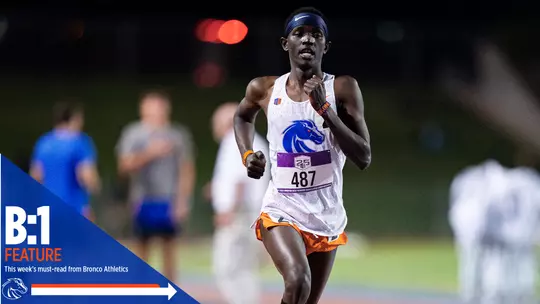
Kapcherop to Boise
Nick Gruber
Kapcherop, Kenya, is located in Elgeyo-Marakwet County, a region often referred to as the “Home of Champions”. Its high-altitude terrain helps runners maximize their conditioning and produces world-class athletes.
Boise State’s Brian Kiprotich is familiar with his homeland’s reputation and is hoping to add his name to the list of elite Kenyan runners. However, achieving world-class running status requires dedication and grit– two qualities he’s experienced in his journey to Boise State.
Kiprotich’s interest in running started at a young age, inspired by his mom, Elizabeth Chemweno, who began running professionally in the late 1990s. For Chemweno, running was a way of life. She never finished high school and committed to the sport full-time at a young age.
“I started running when I was 12 years old,” Chemweno said. “I like running, it helped me travel to so many different countries and also provided a way to make money.”
Seeing his mother as a runner, Brian thought he could follow suit. He competed casually during primary school, running a couple of times a week and slowly fell in love with it. However, when it was time for high school his mom persuaded him to focus less on running and more on studying. She wanted him to earn good grades and attend a good university.
Despite his mother’s encouragement to concentrate on academics, Kiprotich’s passion for running was something that he couldn’t escape. He attended Chewoyet High School, a school that has produced multiple Olympic runners. Most recently, Chewoyet sent long-distance runner Jacob Krop and steeplechaser Amos Serem, who graduated in the same class as Kiprotich, to the Paris Olympic Games.
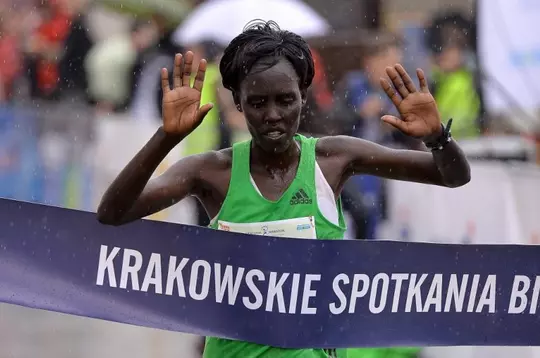
“I remember telling her, ‘Mom, I want to run’. And I actually remember I stole her shoes, I snuck them in my bag before I went off to school.”Brian Kiprotich
Since Brian always looked up to his mom, he ultimately followed her advice to focus primarily on his studies. He didn’t completely quit running, however, and continued to use his mom’s shoes to run once a week. Running has always served as a mental escape for him, so abandoning the sport wasn’t an option.
“Running gives you freedom,” he said. “It’s just you and nature. You don’t have to worry about school or anything, you’re just there running, not thinking about anything. And that’s the good thing about running, you just find yourself thinking about how that tree looks really tall.”
When Brian graduated high school, he turned to his mom again, expressing his passion for the sport. He had finished with good grades, and much to his relief, she was finally ready to fully support him in his journey.
He took advantage of her support by immediately beginning training. His mother told him to start with a 20-minute run, unaware of any of his running in high school.
“She didn’t know I used to run, so she didn’t realize I was aerobically fit,” Kiprotich said. “She told me, ‘Just do 20 minutes and then come and tell me how you feel.’ I went on and did 20 minutes and I felt good, I knew I had more, so I did 40 minutes instead of 20, and she was quite impressed.”
Kiprotich’s mom immediately saw his potential and connected him with the same training groups she had used earlier in her career. In just six months of training with a group, Brian saw immediate success. He posted a 5k time of 15:39.0, a time that would typically take years of training to achieve at his age of 18.
After a full year of training, Brian managed to compete at an under-20 trial race, an event he didn’t realize would change the trajectory of his running career, and ultimately his life.
“I remember this guy who went to Iowa State University. He saw me, and he asked me, ‘Hey Brian, what do you think about going to the U.S. to run? What do you think about studying in the U.S.?’ And I said, ‘Wait, you can study and run at the same time?’”
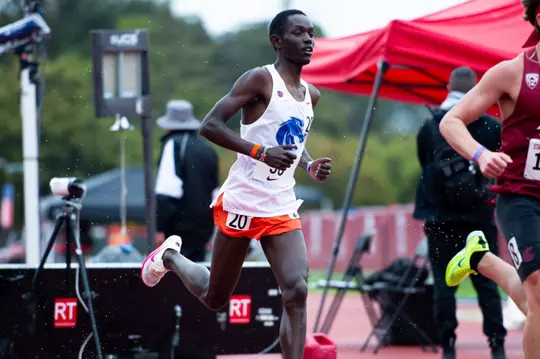
It was at the age of 19 that Brian first discovered what an athletic scholarship was. To receive one, Brian would have to take the SAT, an English proficiency test, and get a visa to come to the U.S.
“That was a challenge,” he said. “I didn’t have SAT scores; I didn’t have English proficiency; I didn’t have anything. It took me three months to get the SAT and send the SAT. I didn't know very much English, I only took one class in high school.”
The English proficiency test was speaking-focused which benefited Brian since he was more familiar with verbal communication than written. The SAT, however, required more reading comprehension and text analysis. Both exams proved to be high-stress, but Brian’s hours of preparation helped him achieve the scores necessary to attend Boise State.
It was finally time for his visa interview, but much to his disappointment, he was denied. Brian recalled feeling broken after receiving the news. He wasn’t ready to give up on his new-found goal of running in the U.S., so he signed up for a second visa interview three months after his initial attempt.
He was denied again.
“That really broke me up. I just wanted to give up and just stop pursuing it. I thought about quitting trying to come to the U.S. I would've just stayed home.”Brian Kiprotich
As he considered his next steps, it was his mom who came to him. He knew that the person who inspired his running and taught his perseverance would push him to not abandon his dream.
“My mom told me, ‘If you’ve started something, just keep doing it. Don’t stop because if you stop today, you don’t know what could come next.’”, said Kiprotich. “So, I decided to keep trying.”
Brian knew that after two visa denials, he had to go all in on his third try. Determined to improve his chances, he began researching countries with higher visa approval rates. He considered South Africa, Tanzania, and Zambia, before ultimately finding Eswatini, a small country formerly known as Swaziland. He scheduled his third interview knowing it would likely be his last chance.
The journey thus far had been challenging, and it wouldn’t get easier anytime soon.
Brian’s trip began with a 10-hour bus commute from Kenya to Uganda. He specifically remembers the tough conditions of the ride.
“The first part, the first 10 hours, was really scary. I had to go through Uganda, and their transport system was horrible. I was sitting in a bus that was supposed to carry 60 passengers, but it had a total of more than 100 people. I was really scared the whole trip.”
Following the initial 10-hour leg came another 17 hours through Uganda and to Rwanda, then a four-hour flight to South Africa. Upon his arrival in South Africa, he boarded one last bus for the final seven hours of his journey.
After 38 hours of travel with no internet or phone, Brian arrived in Eswatini. He checked the time; it was 3 a.m., five hours until his 8 a.m. appointment. Even after an excruciatingly long journey, he was too anxious to sleep.
“I didn’t sleep, I couldn't sleep,” Kiprotich said. “You can’t sleep before it, because even if you did sleep, you’ll probably sleep through your wake-up.”
Alone in a hotel without any internet, Brian had to find a way to pass the time. His best option came from a few books he found on a shelf. They were written in a different language, but he flipped through them to look at the pictures.
Brian sat in the hotel for four hours before walking the fifteen minutes to the Embassy. It was just after 7 a.m. when he arrived and found himself as the first person in the waiting room where he would patiently wait the final hours.
When his name was called for the interview, Brian reflected on what he had endured to get him to his point.
“I got to the interview table and remembered the first two denials. I thought to myself, ‘If I get denied today, it’s gonna be a mess, a big mess.’”Brian Kiprotich
This time around, Brian struck a little bit of luck as the interviewer was familiar with Boise state. And with the help of a letter of recommendation from the university , the cliché, “third time’s the charm” was exactly the case for Brian, as his visa was approved. For him, it was hard to put his feelings into words.
“I remember I was very happy,” he said. “I went and borrowed some bank teller’s cellphone, and I actually forgot my mom’s number. I had to try it seven times until I got the correct one. I called her, told her, she was very happy. It’s hard to explain the happiness.”
For Elizabeth, the emotions were the same.
“The moment Brian got his visa, I was so excited and thanked God because it was our dream,” said Chemweno. “I am so proud of Brian.”

Brian moved to Boise to join the Bronco cross country and track and field program sight unseen. There are few similarities between Kapcherop, Kenya, and Boise, Idaho. The average low in the coldest month in Kapcherop is just over 51 degrees. The average low in the coldest month in Boise is 24 degrees.
“Moving from Kenya to Idaho is like moving from steeplechase to hurdles, or hurdles to steeplechase – where one is tougher than the other in some way,” he said. “Culturally, everything is different, and physically, the weather was the first thing I hated. The first time I came here was in January, on a Friday. It snowed on Monday. It was the first time I had ever seen snow, I was not happy about it. Winter is never going to be my favorite. Never ever.”
The weather transition was tough, but one of the hardest things for Brian was missing home. Since joining the Broncos in January 2023, Brian has not seen his family.
Fortunately, he was joining a program that embodies the word team. Upon his arrival in Boise, his new teammates were there to help him with the transition.
“My team has played a very, very big role in helping me out,” he said. “They were really supportive when I first got here. I remember my first week here, my birthday was in January, so right when I got here they threw me a good birthday party. They took me to this African restaurant downtown. It was my first birthday in like five years. I didn’t use to celebrate my birthday.”
Although it took time for Brian to adapt to his new temporary home, his running never faltered. He has taken advantage of training in the nearby foothills and has embraced a formalized training schedule, something he didn’t have in Kenya.
This new routine has helped Brian achieve even greater levels of fitness, and in turn, has protected him from potential injuries. The results were evident in his first year of competition with the track team. He set four new personal bests, including a 28:57.98 in the 10,000-meter, marking the fourth-fastest time in the event in outdoor program history. His efforts earned him a spot in the NCAA Outdoor Track and Field West Preliminary rounds where he finished 19th, 26 spots ahead of his ranking going into the meet.
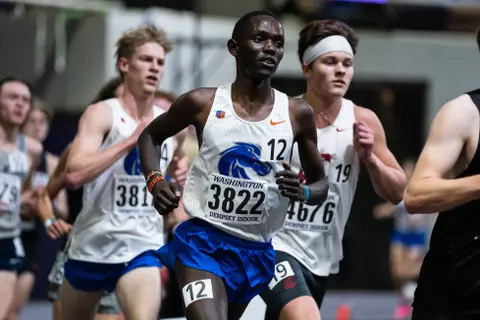


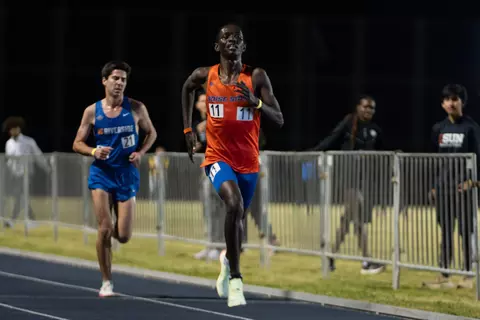
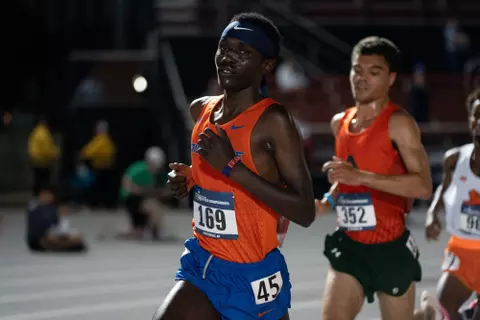
For new head coach Pat McCurry, having Brian on the team is incredible.
“He's an elite talent,” said McCurry. “Like absolutely elite, there’s no doubt. Just the way he moves over the ground and the effort with which he’s able to do so just stands out. Brian adds to that lead group quite a bit, I’m looking forward to seeing how he will contribute.”
Brian’s late arrival held him out of the 2023 cross country season, but he’s already hit the course in the Blue & Orange this season with high expectations for himself. Kiprotich is working to break the 24 minute mark in the 8k, finish top-10 in three races, finish top-five in regionals, and be an All-American.
The expectations for Kiprotich are similar in coach McCurry’s mind.
“I think the next level for him is to get to an NCAA Championships meet, whether that’s in cross or indoor or outdoor. He certainly should be capable of that.”
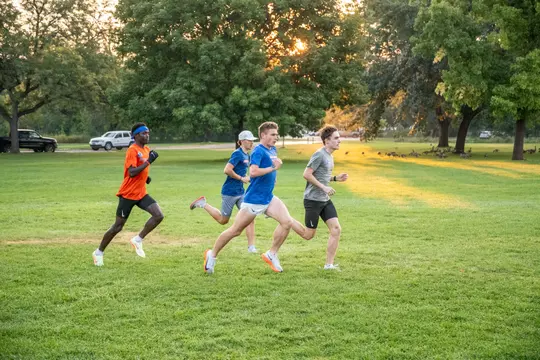
In the first race of the 2024 season, Brian led the charge for the Broncos, finishing 12th overall and first amongst the team. He helped the Boise State men earn a third-place finish at the MSU Bobcat Twilight in his collegiate cross country debut.
Brian has experienced success in the nine short months since arriving at Boise State. However, these achievements are only the beginning for him, he has long-term goals and lofty aspirations.
“By the end of my college career, I’ll probably want a few school records,” he said. “It’s a good goal, and I want to get myself good times that would enable me to go pro. And of course, I have a dream to be an Olympic runner, which I know needs a lot of perseverance and everything.”
Outside of competing, Brian continues to follow his mom’s advice to stay focused on school. He is working toward a degree in biology, which he believes will allow him to stay connected to runners, with the ultimate goal of venturing into food and nutrition, or sports medicine.
No matter what his future holds, Brian vows to continue to use his family as inspiration.
“They look up to me,” Kiprotich said. “They just know Brian is in the U.S. which is a very big thing. That’s what keeps me going.”
To support Boise State cross country consider making a donation to the Enhancement Fund, or by contacting the Bronco Athletic Association at (208) 426-3556 or baa@boisestate.edu.
